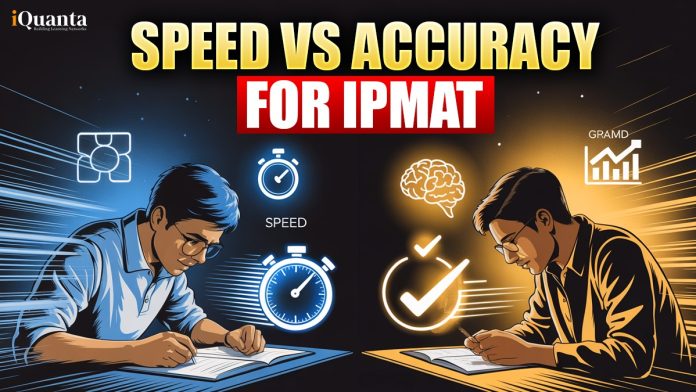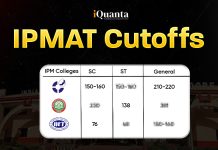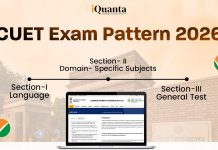The Integrated Program in Management Aptitude Test (IPMAT) is a highly competitive entrance exam that offers admission to the prestigious Indian Institutes of Management (IIMs) for their five-year Integrated Program in Management (IPM). Conducted by several IIMs including IIM Indore, IIM Rohtak, and IIM Jammu/Bodh Gaya, each version of the IPMAT differs in terms of exam patterns, difficulty levels, and syllabus. When we are talking about the competitive entrance examinations then speed vs accuracy are very important factors that are debatable. Speed and accuracy go hand in hand because solving question paper on time requires good speed and getting maximum scores in the IPMAT exam requires accuracy.
With thousands of aspiring students appearing for these exams each year, speed and accuracy are crucial factors that can determine success or failure. Students should check the complete details about the speed vs accuracy in IPMAT. In this blog, we will be talking about the comparison between speed vs accuracy in IPMAT, improving speed and accuracy in the IPMAT exam, and more.
Join this free IPMAT preparation group to get free study material, strategies by toppers and experts, latest updates and more

IPMAT Exam 2026 Overview
IPMAT exam is a key step for students aspiring to enter the Integrated Program in Management (IPM) offered by various IIMs across India. The format of the IPMAT 2026 exam is expected to be similar to what the exam was in previous years and each IIM will have its own exam.
In case of IPMAT Indore, IPMAT Rohtak and IPMAT Jammu/Bodh Gaya, the exam pattern, syllabus and dates can be slightly different. The following table contains the most important information about IPMAT 2025 to have a general understanding of the structure of the exam:
| Particulars | IPMAT Indore | IPMAT Rohtak |
| Exam Name | Integrated Program in Management Aptitude Test (IPMAT) Indore | Integrated Program in Management Aptitude Test (IPMAT) Rohtak |
| Conducting Authority | IIM Indore | IIM Rohtak |
| Mode of Exam | Online (Computer-Based Test) | Online (Computer-Based Test) |
| Exam Duration | 120 minutes (2 hours) | 120 minutes (2 hours) |
| Total Sections | 3 | 3 |
| Sections | Quantitative Ability (MCQ & SA) Verbal Ability | Quantitative Ability Logical Reasoning Verbal Ability & Reading Comprehension |
| Total Questions | 90 | 120 |
| Marking Scheme | +4 for correct -1 for wrong (MCQ) No negative for SA | +4 for correct -1 for wrong (MCQ) |
| Overall Difficulty | Moderate to Difficult | Easy to Moderate |
These variations underline the fact that while the broad structure remains the same, each IIM’s IPMAT has its own nuances that students must account for during preparation.
What’s more Important in the IPMAT Exam – Speed or Accuracy?
Speed and accuracy are also very important when it comes to preparing competitively such as an IPMAT exam. The final objective is to bring balance so that you are able to attempt the right number of questions in the restricted time correctly.
Accuracy in the IPMAT Exam
- Accuracy refers to how correct your answers are. In IPMAT, a correct answer typically earns you +4 marks, but an incorrect answer results in a -1 penalty (in MCQ sections).
- The more accurate you are, the more marks you retain, and negative marking doesn’t erode your score.
- For sections without negative marking (like Quantitative Ability SA in IPMAT Indore), accuracy remains important but doesn’t lead to penalties.
Speed in the IPMAT Exam
- Speed refers to how quickly you can solve questions. In exams like IPMAT, time is crucial, as you are often required to solve dozens of questions within a fixed time.
- For example, in IPMAT Indore, you have 2 hours (120 minutes) to answer 90 questions, meaning you need to spend about 1.33 minutes per question on average.
- Without the ability to maintain a good pace, even if you are accurate, you might run out of time before completing the exam.
The Verdict: Striking the Right Balance
Neither speed nor accuracy should be emphasized at the cost of the other. Both play a complementary role:
- High Accuracy, Low Speed: You may score well on the questions you attempt, but if you don’t attempt enough questions, your total score could be capped.
- High Speed, Low Accuracy: You might attempt many questions, but negative marking could drastically lower your overall score.
The ideal strategy for IPMAT preparation is to develop “accurate speed,” which allows you to solve questions both quickly and correctly. This balance will help you avoid unnecessary penalties while maximizing your attempts.
How to Improve Speed and Accuracy for the IPMAT Exam
Improving both speed and accuracy involves strategic preparation, regular practice, and focused efforts. Here are key strategies to help you hone these skills:
1. Master the Fundamentals
- Make sure that you understand the key concepts regarding each part of the exam: Quantitative Ability, Verbal Ability, and Logical Reasoning.
- Formula recall and mental math techniques will help speed up your problem-solving abilities.
2. Practice, Practice, Practice
- Solve timed practice tests and mock exams regularly to simulate actual exam conditions and pressure.
- Work on sectional tests to identify your strengths and weaknesses, and improve your accuracy in weaker areas.
- Expose yourself to a wide variety of question types and difficulty levels.
3. Effective Test-Taking Strategies
- Question Selection: Identify the easiest and most straightforward questions first, and attempt them quickly. Leave difficult questions for later.
- Elimination Technique: For MCQs, practice eliminating at least two wrong options to increase the probability of making an educated guess.
- Reading Comprehension: For verbal sections, work on skimming through passages efficiently to grasp the main idea and locate key details.
- Mental Math Shortcuts: Develop shortcuts for frequently tested mathematical problems to avoid lengthy calculations.
4. Analyze Mock Tests Thoroughly
- Error Analysis: Review every mistake in detail. Understand if it was a conceptual error, a calculation error, or simply a time mismanagement issue.
- Time Management: Identify sections where you spent too much time. Try to optimize your pacing for the actual exam.
5. Physical and Mental Well-being:
- Adequate sleep and stress management techniques (like deep breathing or mindfulness) can enhance your performance on the exam day.
- Ensure a healthy diet that supports cognitive function during your preparation.
Conclusion: Speed vs Accuracy in IPMAT
Speed vs Accuracy in the IPMAT exam both will cover the important during IPMAT 2026 because speed plays an important when it comes for solving the question paper and this overall defines the time management for solving questions across sections and the accuracy revolves around where we have to solve maximum question correctly within a given time frame. So for any competitive exam like IPMAT, speed and accuracy both are very important for getting maximum scores across sections in IPMAT Indore as well as in IPMAT Rohtak.
If you are looking for a structured preparation for IPMAT along with 24×7 doubt solving, then you can go for iQuanta’s IPMAT Course

Speed vs Accuracy in IPMAT FAQs
A1: In most cases it is recommended to not guess without being ready to exclude at least two of the wrong choices. This gives you a better probability of guessing with probability of around 50 per cent.
A2: At IPMAT Indore (120 minutes and 90 questions) there will be around 1.33 minutes per question, and an around 1 minute per question at IPMAT Rohtak (120 minutes and 120 questions). Adjust the time according to the questions difficulty.
A3: it is nearly always better to get fewer questions wrong. Although probably you would answer less questions, you would not get so many penalties in case you are wrong and thus your score would be more trustive.
A4: Sectional cut-offs are extremely important. The cut-offs should be cleared on individual sections and not on the overall exam. Make sure that you have a good speed and accuracy in all portions.
A5: Mock sessions are like the real ones, you will be preparing stamina and time management. They are also used to enable you to work on your test-taking including the areas to work on.
Speed vs Accuracy in the IPMAT exam both will cover the important during IPMAT 2026 because speed plays an important when it comes for solving the question paper and this overall defines the time management for solving questions across sections and the accuracy revolves around where we have to solve maximum question correctly within a given time frame.




